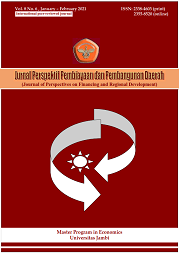An empirical nexus between poverty and unemployment on economic growth
DOI:
https://doi.org/10.22437/ppd.v9i1.12005Keywords:
Economic growth, Poverty, UnemploymentAbstract
The study examines the empirical nexus between poverty and unemployment on economic growth in Nigeria between 1980 and 2016. Auto-Regressive Distributed Lag (ARDL), Bound cointegration testing, and Error Correction Methods (ECM) were used to investigate the link between unemployment, poverty rate, and economic growth in Nigeria. Post estimation tests such as the Jarque-Bera test, Breusch-Pagan, ARCH test, and Ramsey reset test were also adopted in order to validate the research finding. The diagnostic tests further disclosed that the estimated model follows the Ordinary Least Square technique assumptions to attain efficiency and consistency of the model employed. The Jarque-Bera test suggests that residuals for both models are normally distributed, and the Breusch-Godfrey Serial Correlation (LM) test indicates that the hypothesis of no autocorrelation cannot be rejected. Interestingly, the ARDL and ECM results show that unemployment and poverty significantly impact economic growth both in the short and long run. Hence, the study recommended that the Nigeria government should ensure that adequate measures are put in place: Such as investment in education, agricultural sector reform, expansionary fiscal policy, intervention in micro-lending for small scale businesses by the government should be implemented to reduce the level of unemployment and poverty rate both in the short run and long run.
Downloads
References
Akintoye, IR. (2008). Reducing Unemployment through the Informal Sector: A Case Study of Nigerial. European Journal of Economics, Finance and Administrative Sciences, 11, 97-106
Alanana O. (2003). Youth unemployment in Nigeria, Some Implications for the third Millennium. Global Journal of Social Sciences, 2(1), 21-26.
Bankole A.S & Fatai, B.O. (2013). Empirical Test of Okun’s Law in Nigeria. International Journal of Economic Practices and Theories, 3(3), 227-231.
Bakare AS. (2010). The Determinants of Urban Unemployment Crisis in Nigerian: An Econometric Analysis. Journal of Emerging Trends in Economics and Managment Sciences (JETEMS), 2(3), 184-192
Central Bank of Nigeria. (2010). Statistical Bulletin Vol. 19, December, 2010. Nigeria: Central Bank of Nigeria
Grusky, D. & Kanbur, R. (eds.), (2006). Poverty and inequality. Stanford; Stanford University Press
Muhammad,U.F & David, J. (2019). Relationship Between Poverty and Unemployment in Niger State. Signifikan: Jurnal Ilmu Ekonomi. 8(1), 71 – 78.
Oladipo, O. S. (2009). Does saving really matter for growth in developing countries? The case of a small open economy. International Business & Economics Research Journal, 9(4), 87–94
Olofin, O. P. (2012). Defense Spending and Poverty Reduction in Nigeria. American Journal of Economics, 2(6), 122-127.
Obadan, M.I & Odusola, A. (2005), Productivity and Unemployment in Nigeria. National Centre for Economic Management and Administration NCEMA.
Rizwanul, I. (2004). The Nexus of Economic Growth, Employment and Poverty Reduction: An Empirical Analysis. Issues in Employment and Poverty Discussion Paper. Recovery and Reconstruction Department International Labour Office, Geneva.
Salami, C.G.E. (2011). Entrepreneurship and Youth Unemployment in Nigeria: The Missing Link. Global Journal of Management and Business Research, 11(5)
Sen, A. (1999). Development as Freedom. Oxford: Oxford University Press.
Sinnathurai V. (2013). An Empirical Study on the Nexus of Poverty, GDP Growth, Dependency Ratio and Employment in Developing Countries. Journal of Competitiveness, 5(2), 67-82
United Nations Development Programme. (1990). Human Development Report. Oxford: Oxford University Press.
United Nations. (2006). Indicators of sustainable development: guidelines and methodology. New York: United Nations
Yesufu, T.M. (2005). Tackling unemployment in Nigeria. Opening remarks during a National Workshop on Investment for Poverty Reduction, study under the aegis of the jobs for Africa/PRESSA programme, Abuja.
Downloads
Published
How to Cite
Issue
Section
License
Copyright (c) 2021 KEJI Sunday Anderu

This work is licensed under a Creative Commons Attribution 4.0 International License.





















